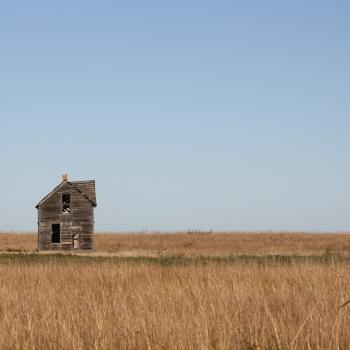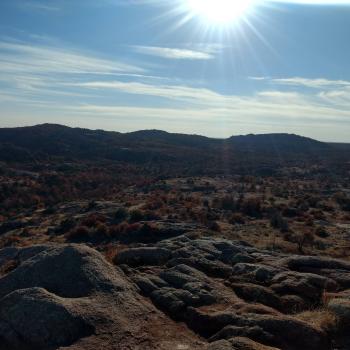
Ages ago, my wife and I drove up along snaking, low mountain highways in New Hampshire to see the Old Man of the Mountain. The Old Man was a rocky outcrop that, when viewed from the correct angle, gave the impression of a stern face, jutting forehead and hardset jaw. Some saw the Old Man of the Mountain as emblematic of the rugged, live-free-or-die spirit of the Granite State. In fact, New Hampshirites liked him so much that they featured the Old Man on their 2000 state quarter.
Perhaps what attracted people to the Old Man of the Mountain was his rocky indifference to the elemental hardships. We imagined him as us (or us as him), looking placidly out over the vistas of history, unblinking and unafraid, strong spine of granite holding his head aloft.
You see the virtue of indifference carved across the Scriptures. It’s Joshua calling the people to “be strong and courageous”–indifferent to giants and high enemy walls (Joshua 1:6). It’s Christ calling the churches in Revelation to “hold fast”–indifferent to fear (Revelation 2:25, 3:11). It’s the apostle Paul saying over and over again “endure”–indifferent to persecution and testing and suffering and just everything (1 Corinthians 4:12, 10:13; 2 Corinthians 1:6; Colossians 1:11). This is an indifference that comes from a deep, granite core of faith in God. Sometimes, it looks like stubbornness (which is not all bad), but indifference as a Christian virtue means accepting God’s will, come what may. This indifference is about acting without needing to experience the immediate fruits of our labors. It’s an indifference that flows from loving God above all things.
When we love God above all things, we start to experience a holy indifference to the fears and trials of life. It’s not that we don’t care–especially not that we don’t care about other people. To love God deeply is to love others deeply as well. But there’s a kind of focus on the will and ways of God that allows us to “consider the ravens” and the lilies in their abundance of food and raiment and paucity of worry (Luke 12:24-27). This is a worthy and good indifference.
But so too there is a shabby and miserly indifference that is unworthy of our humanity. This indifference flows from inordinate love of self. Everything else is seen in the light of that self-love, measured by the yardstick of our wants and wishes. Its cousin is callousness, and Jesus has strong words against such indifference. In Luke 16, poor man Lazarus languishes outside the rich man’s gates, bespeckled by sores, with only dogs for companions and nurses. He dies and is whisked by angels to the “bosom of Abraham” (Luke 16:22). Meanwhile, the rich man dies and descends into Hades, the place of the evil dead, where he is tormented in flames (Luke 16:23). He was a big man with a big table in life. But now it’s all come to dust and ashes. We don’t even know his name.
Jesus’ dramatic parable is loaded with meaning, not least that our possessions do not belong to us alone, but to God, that the poor have a claim on us, and that we can never be wholly at ease with our stuff. But the story is not about sheer wealth or abjectivity. It’s a parable of indifference. That was the rich man’s sin. And that indifference is a sin precision-milled for our age.
Faced with the internet’s fearsome capacity to show us the lives of distant people and distant tragedies, we wall ourselves off, draw back. We can’t care about all of it, so sometimes we choose to care about none of it. Out of psychological self-defense we become indifferent. Yet indifference doesn’t merely play out in the stark and striking terms of Jesus’ parable: rich/poor, far/near, insiders and marginalized. Indifference can also be our failure to notice the other, welcome the stranger, reach out to the lonely. The consequences can be steep, especially in our most rural communities.
A recent NPR report documented the struggles with loneliness and isolation that people sometimes face in rural areas. The report concluded that “2.5 million rural residents…say they have no friends or family nearby to rely on. An additional 14 million (about 39%) say they have only a few people.” Reading numbers like these can jar us from indifference and add a sense of urgency to the feeling that we ought to walk over to meet the neighbors.
The Old Man of the Mountain, face braced against wind, rain, frost, and temblors, turned out to not be so indifferent after all. In 2003, he cracked ten-million ways, and though the people of New Hampshire tried to shore up their rocky landmark with iron stakes and many-stranded cables, the Old Man made one last stony grimace and sloughed off the mountainside into memory.













